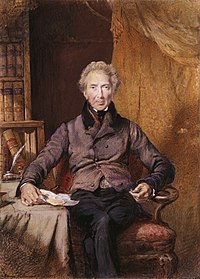Sir John Shore
|
The Right Honourable The Lord Teignmouth |
|
|---|---|
 |
|
| Governor-General of the Presidency of Fort William | |
|
In office 1793–1797 |
|
| Monarch | George III |
| Prime Minister | William Pitt the Younger |
| Preceded by | The Earl Cornwallis |
| Succeeded by |
Sir Alured Clarke As Acting Governor-General |
| Personal details | |
| Born | 5 October 1751 |
| Died | 14 February 1834 (aged 82) |
| Alma mater | Harrow |
John Shore, 1st Baron Teignmouth (5 October 1751 – 14 February 1834) was a British official of the East India Company who served as Governor-General of India from 1793 to 1797. In 1798 he was created Baron Teignmouth in the Peerage of Ireland.
Shore was the first president of the British and Foreign Bible Society. A close friend of the orientalist Sir William Jones (1746–1794), Shore edited a memoir of Jones's life in 1804, containing many of Jones's letters.
Born in St. James's Street, Piccadilly, on 5 October 1751, he was the elder son of Thomas Shore of Melton Place, near Romford, an East India Company employee, by his wife Dorothy, daughter of Captain Shepherd of the Company's naval service. At the age of fourteen Shore was sent to Harrow School. In his seventeenth year Shore was moved to a commercial school at Hoxton for the purpose of learning bookkeeping, to take up an opportunity made for him by the merchant Frederick Pigou, a family friend. Towards the close of 1768 he sailed for India as a writer in the East India Company's service.
Soon after his arrival in Calcutta in May 1769, Shore was appointed to the secret political department, in which he remained for about twelve months. In September 1770 he was nominated assistant to the board of revenue at Murshidabad. Shore at the age of 19 suddenly found himself invested with the civil and fiscal jurisdiction of a large district; he also studied languages.
In 1772 Shore went to Rajshahi as first assistant to the resident of the province. In the following year he acted temporarily as Persian translator and secretary to the board at Murshidabad. In June 1775 he was appointed a member of the revenue council at Calcutta. He continued to hold that post until the dissolution of the council at the close of 1780. Though he revised one of the bitter philippics launched by Philip Francis against Warren Hastings, and is said to have written one of the memorials against the supreme court and Sir Elijah Impey, he was appointed by the governor-general to a seat in the committee of revenue at Calcutta, which took the place of the provincial council.
...
Wikipedia
